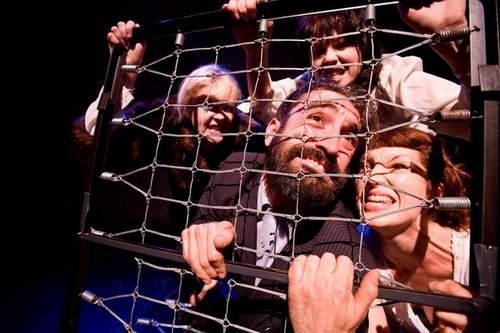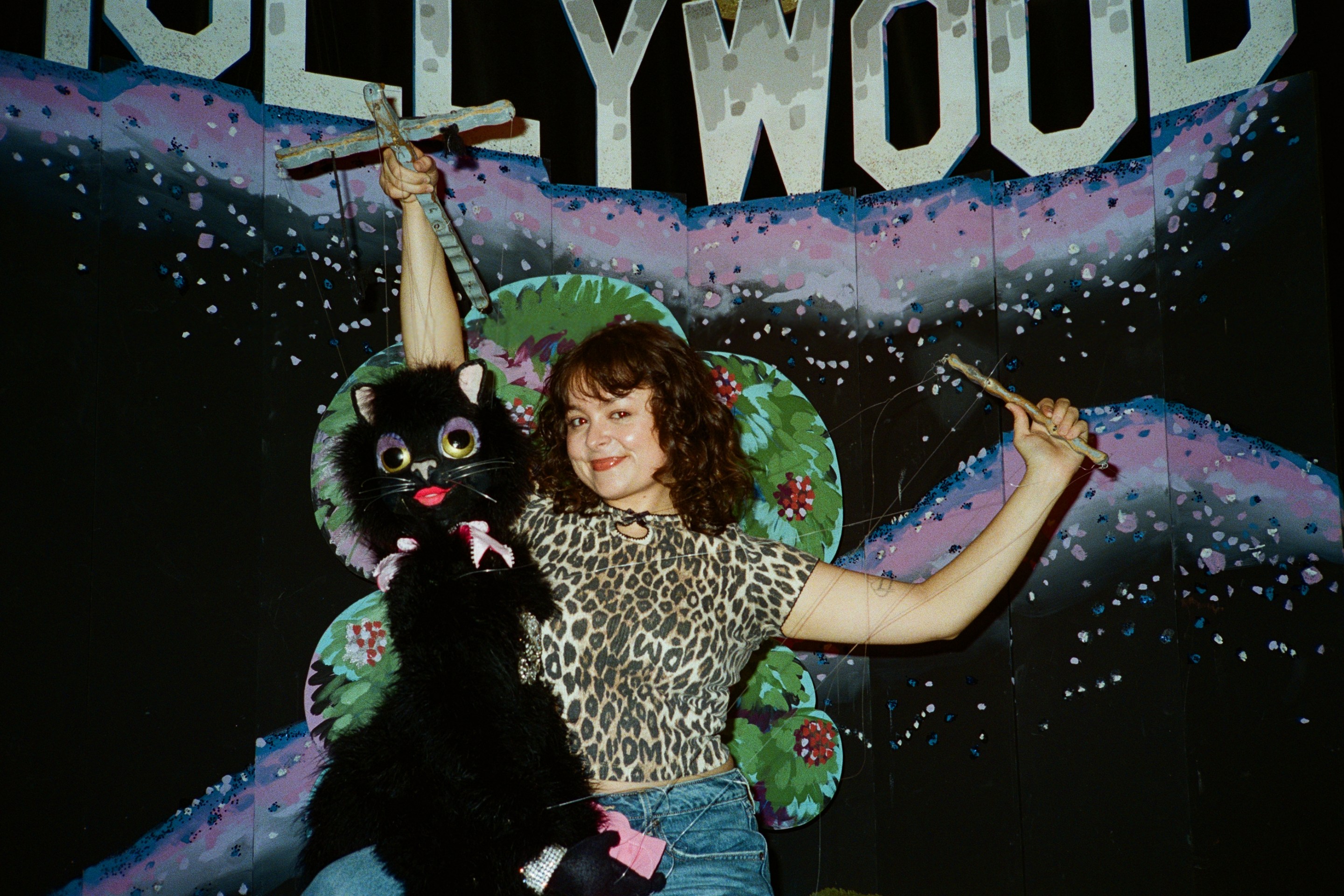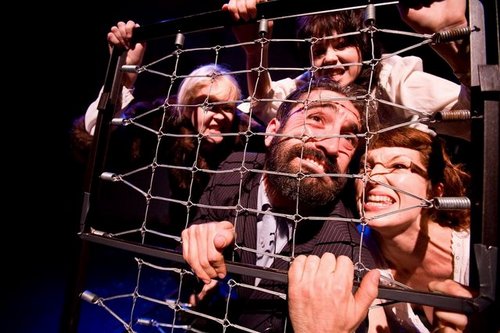
Keirin Brown (L,) Olya Petrakova (standing), Bryan Brown and Ilana Turner. All photos by Taso Papadakis.
After literally feeling your way to a seat in the pitch dark theater, you hear actors moving about on stage, feeling that anytime now the lights should shine. The performers sound like they're shoveling dirt, but you really don't know, as you can't even see your hand one inch in front of your eyes. Strangers next to you are antsy. "Lights please!" Despite a few audience complaints, whoever is on stage goes about their dirty business, echoing machines from the dawn of the industrial era or maybe the monster hiding in your closet, whose sole purpose is to get you.
"TURN THE LIGHTS ON!" spectators are now shouting. Sharing my peers' mounting anxiety, I also jubilate in witnessing the house stand up for its rights, holding cell phones over their heads like torches. The American Russian Theatre Ensemble Laboratory has struck again!
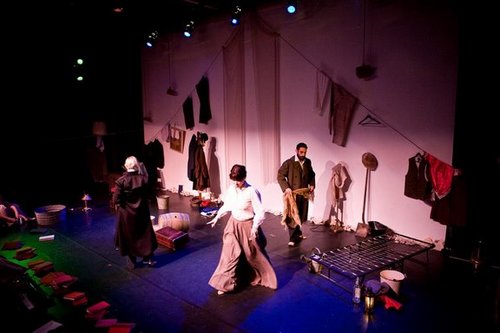
These 10 minutes of revolutionary theater was ARTEL's way of kissing 2006 goodbye. Last December, the provocative ensemble folded 2007 with a two-night presentation of their work-in-progress: Variation #50 (the memorable adventures during the legendary times of Mikhail Afanesievich Bulgakov) at Highways Performance Space.
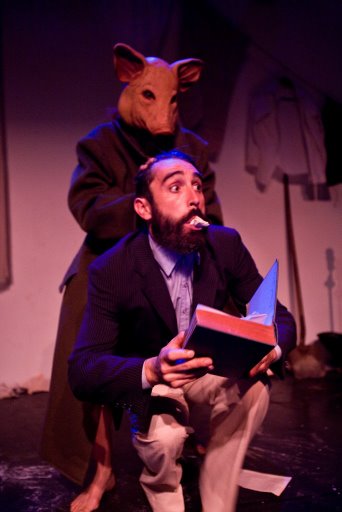
Author Mikhail Bulgakov in the hands of Stalin (Ilana Turner.)

Under ARTEL's domination, the stage suggests a street off of Skid Row, in the early morning, when the unhoused slowly wake, stir, and start their daily routines. Clothes hang on makeshift hooks, suitcases are strewn on the floor next to buckets, shovels and the skeleton of a bed. Actors, deep in character set the stage, get dressed, and mumble. Who are these forms? What are they doing? Whose names are being written on that blackboard? Like a trusted lover, ARTEL savors blindfolding us, keeping us waiting, wanting, guessing...our senses wide awake, ready to engage.
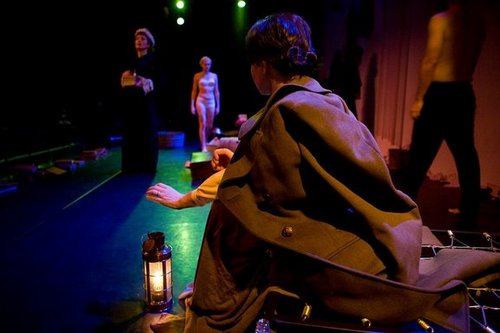
"Nowhere (but in Russia) has the artist been more burdened with the task of moral leadership and national prophecy, nor more feared and persecuted by the state."
~Orlando Figes
Despite the unspeakable hardship suffered by the Russian people during Stalin's cruel reign, ARTEL chooses to emphasize Russian resilience and zest of spirit, depicting playwright/novelist Mikhail Bulgakov's life as a "memorable adventure." Besides Bryan Brown, who portrays the legendary author of Master and Margarita throughout the show, each of the other three actors play multiple characters.
The roles, largely, are comical, like clowns torn from the tent of an old-fashioned carnival, always mischievously pointing out that they can make you laugh, or cry, on their whim. True to their ancestral roots, the performers adorn themselves with devil and animal masks, furs, and wigs. They snap to play flutes, sing songs, and tap, wrap, and bang on floors and buckets, creating a symphony of spectacle and shock, always journeying on roads less traveled, stretching their wild imagination muscles to suggest, rather than dictate, Bulgakov's incredible journey.
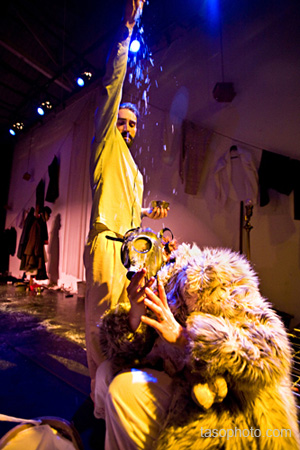
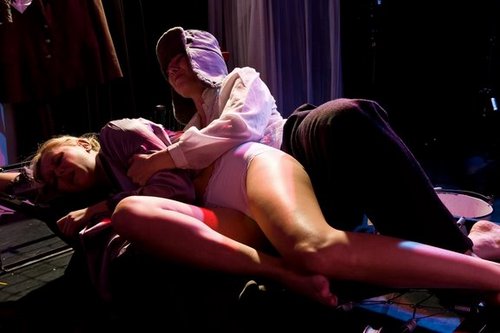
Keirin Brown (L) and Olya Petrakova: conceiving Bulgakov?
The abstract commencement left the writer's early days obscure. The smoke cleared when, supported by a strong and gentle woman (Ilana Turner), Bulgakov transitions from life as a doctor to controversial author who is subjected to both celebration and iron-fisted abuse.
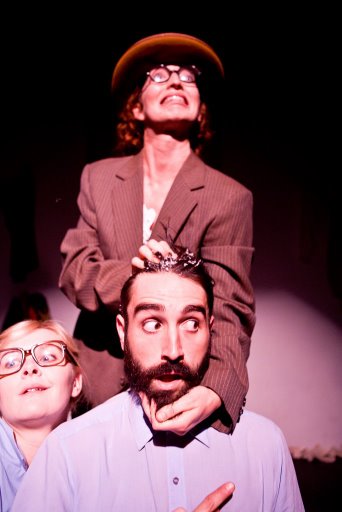
Nutty Professor Ilana Turner (standing), assistant Keirin Brown (L) and Bryan Brown as Mikhail Bulgakov.
Ilana Turner and Keirin Brown take full advantage of their dynamic chemistry in a scene where Turner plays a nutty professor standing on a cart straight out of Dr. Frankenstein's lab, wheeled in by an apprentice who shares the monster's rigid limbs. Each new promise the professor makes in the name of Communism acts as a lubricant on her assistant's joints. With a jerk of the knee here and a squeak there, a new member of the party is formed.
"We can build the Eiffel Tower, but we cannot improve man!" asserts the Professor. Yet Socialism is about to embark on this impossible challenge, using the Communist regime's enemies as their guinea pigs. Because of his brilliant and outspoken writing, Bulgakov becomes the object of unwanted attention from KGB interrogators and Stalin himself.
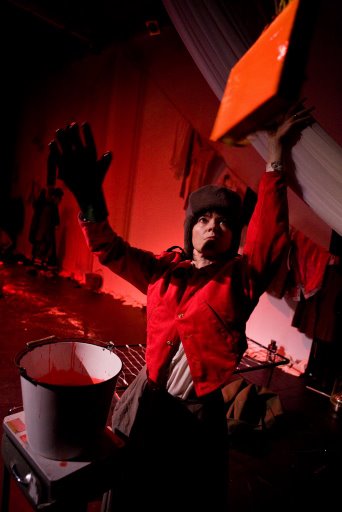
Olya Petrakova.
An army of red manifestos guard the front stage. Banned books are dipped in red paint by an efficient collaborator (Olya Petrakova gracing the stage in her native Russian and a gift for gender-bending roles). Stalin's complete invasion and possession of the Russian soul culminates in a choreography of horror where, in perfect unison, the four actors yap and slam their red books open and close as if stomping their critical minds to death.
In his yard, a confident Stalin carefully waters his revolutionary gospel with a can while, in another stunningly evocative scene, pages of books burn like candles in the Russian people's hands, who then kneel down to regurgitate rose petals suggesting that Nature and the cycle of creativity - both joyful and painful - is a force that no man or army can interrupt.
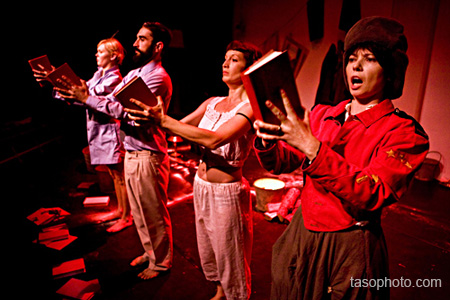
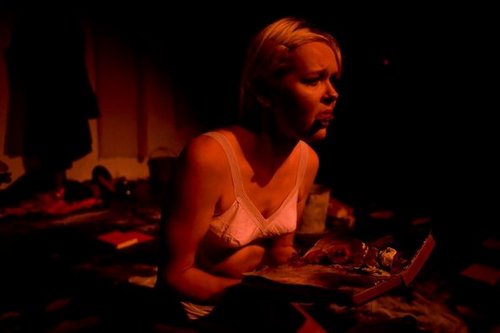
Keirin Brown.
Bulgakov's books, judged offensive by the totalitarian regime, are forcefully fed to him by a Stalin, bedecked in a long khaki overcoat and pig mask. Bulgakov is stepped on, toyed with, and interrogated so many times it's no surprise the artist ends up with a lamp shade over his head, uttering the same words over and over again like a broken doll.
Surrounded by a cast of shady characters more fictional than real, and the furtive apparition of an unwaveringly supportive wife, Bryan Brown's Bulgakov is both vulnerable, playful, terrified, and yet stays hopeful. Because of ARTEL's unconventional brand of physical theater, Bulgakov and his wife never get their Hamlet moment and reveal to us their existential anguish. If the show brilliantly demonstrates the chaos and torment endured by Bulgakov in his lifetime, it restricts our access to Bulgakov's true mind and heart, thus risking to deprive viewers of a full emotional catharsis.
The author is asked repeatedly throughout the play: "Do you believe in Communism? Do you believe in God?" Bulgakov professes to be an atheist, so to whom is he speaking his final words: "Receive Me?"
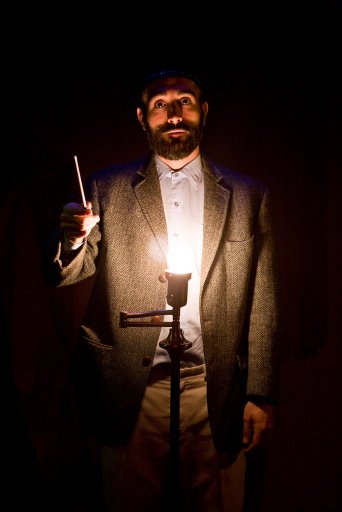
How did his religious wife cope in a world which banned God's words and her husband's? ARTEL chooses to withhold answers. Fearless, avant-garde and determined to make us active participants in the creative process, ARTEL' shows are as disorienting and exhilarating as a trip to another of my favorite LA wonders, The Museum of Jurassic Technology, where every room defies expectations and logic, stripping us of everything familiar.
For answers, we can always march to the library to learn from the Master himself whose written words are widely available... for now. In this electoral year, ARTEL is a gift not only to LA theater, but to the democratic process itself, celebrating and embodying individuals who creatively stand against tyranny.
